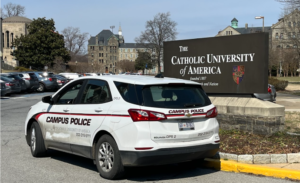Scoot, it’s Electric

By Kate Janik
Electric scooters have been rising in popularity since they first hit the streets of D.C. in January of 2017. Now, these fun rides are located in over 100 cities worldwide, more than 20 countries, and five continents. With this exponential growth in scooter popularity, how can Catholic University students hop on this trend and how is it transforming the way we see transportation in cities today?
The first e-scooter was introduced by the up-and-coming company Lime in an effort to provide accessible and affordable mobility. The company believes will lead to a healthier and cleaner planet by reducing the need for less eco-friendly transportation like cars. Since the launch of Lime, several other electric scooter applications have been created that offer users a fast, cheap, and accessible mode of transportation like Lime. Washington, D.C. alone has over five thousand electric scooters from some of the major frontrunners of the industry, such as Lime, Bird, Spin, Skip, and Goat.
E-scooters have grown in popularity due to a growing push for more fuel-efficient and eco-friendly opportunities. Lime estimates that every mile on a scooter saves close to 350 grams of carbon. Multiply that by a city of 10,000 scooters running for 10 miles a day and scooters could be saving 35 metric tons of carbon daily.
With a society that is shifting its gaze to more earth-friendly alternatives, this new startup scooter market was valued at 17.48 billion dollars in 2018 and is projected to grow 8.5% within a year. Steve Jobs strongly believed that electric scooters would have a greater impact than personal computers, with cities being designed around them specifically.
However, there are some negative aspects of scooters. Ally Kirby, a Catholic University sophomore studying accounting, expressed her concern for riders’ safety.
“Riders are susceptible to injury and can make it difficult for drivers in a congested environment,” Kirby said.
This concern is supported by the growing number of injuries and even deaths in the United States. According to Consumer Reports, there have been over 1,500 accidents involving scooters in the past year. The majority of these accidents happen because tourists ride without helmets or without paying attention to the traffic laws. Scooter companies rely on the honor code to keep their vehicles safe, and it is the riders’ responsibility to follow basic safety precautions.
Many colleges have brought these e-scooters to campus, including Catholic University. E-scooters are scattered throughout campus, and with a quick download and a few taps, Catholic University students can be zipping across campus from Gibbons to O’Boyle in order to reach class on time. E-scooters are changing how we view transportation in cities and college campuses, the question is will you hop on and ride with us?








